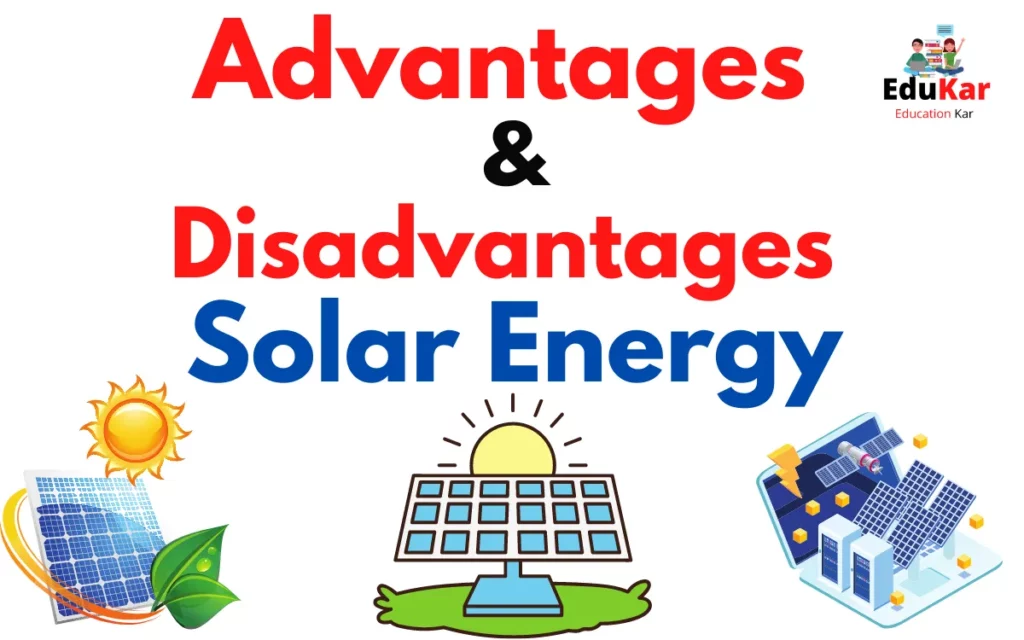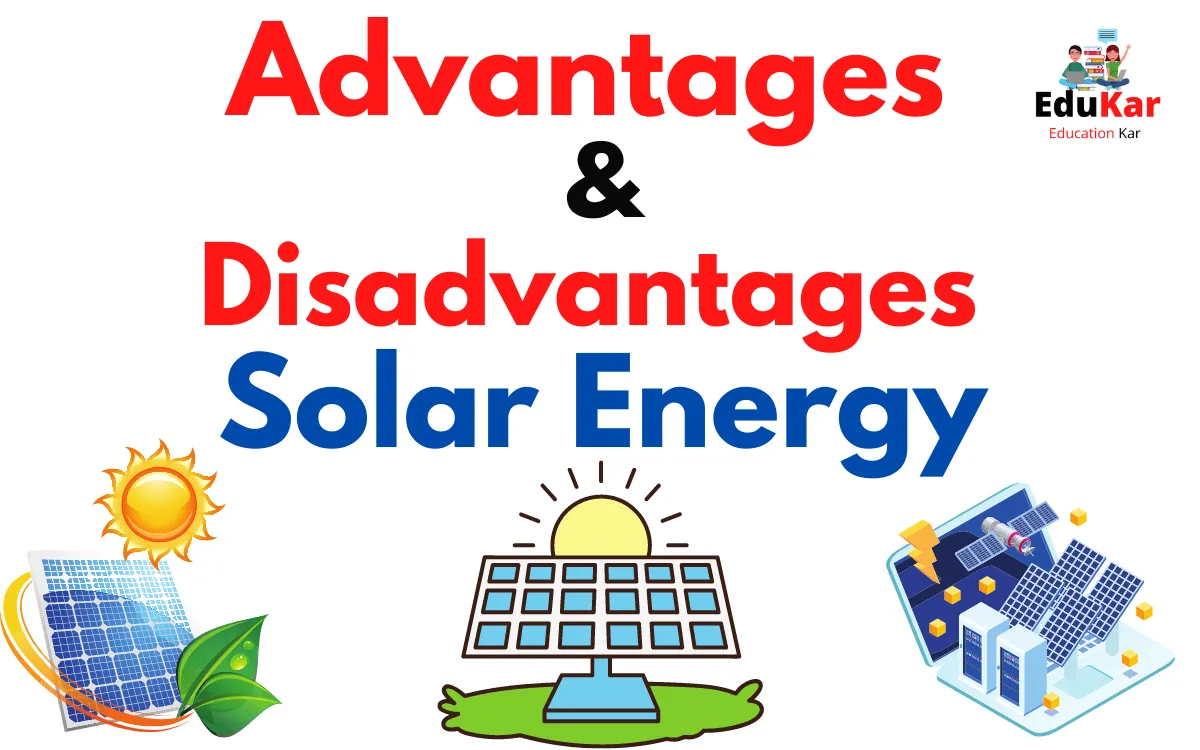Welcome to Edukar.in! Explore the benefits and drawbacks of solar energy. Learn about the advantages of solar power, including cost savings and environmental benefits, as well as the potential disadvantages, such as weather dependency and initial installation costs.

Solar energy has become a popular alternative to traditional sources of energy due to its numerous benefits. The use of solar power can lead to cost savings and reduction in carbon footprint, making it an environmentally friendly option. However, it’s important to consider the potential disadvantages of solar energy, such as dependency on weather conditions and the high initial installation cost. Despite these drawbacks, the advantages of solar energy make it a valuable investment for both residential and commercial properties. Stay informed and weigh the pros and cons to determine if solar energy is the right choice for you.
What is Solar Energy?
Solar energy is a form of renewable energy that harnesses the power of the sun to generate electricity. It works by using photovoltaic (PV) panels or solar thermal collectors to convert sunlight into usable energy. Solar panels are made up of photovoltaic cells that contain semiconductor material, typically silicon. When sunlight hits the cells, it creates an electric field, which causes electricity to flow.
Solar energy has numerous benefits, including being a clean and renewable source of energy, which reduces dependence on fossil fuels and lowers greenhouse gas emissions. It also offers cost savings, as the initial investment in solar panels can be offset by reduced energy bills over time. Solar energy is also versatile, as it can be used in a variety of settings, including residential homes, commercial buildings, and even large-scale power plants.
However, the use of solar energy is not without its challenges. Weather conditions such as cloud cover and shading can significantly impact the effectiveness of solar panels. In addition, the initial cost of installation can be high, although various incentives and subsidies are available to help offset these costs.
Despite these challenges, solar energy continues to grow in popularity as more people become aware of its benefits. As technology improves and costs continue to decrease, it is likely that solar energy will play an increasingly important role in meeting the world’s energy needs. Whether you’re a homeowner looking to reduce your energy bills or a business looking to reduce your carbon footprint, solar energy offers a clean and cost-effective solution.
| Advantages of Solar Energy | Disadvantages of Solar Energy |
|---|---|
| 1. Renewable and Sustainable | 1. Dependence on sunlight availability |
| 2. Low Environmental Impact | 2. Initial installation costs |
| 3. Energy Independence | 3. Energy storage limitations |
| 4. Low Operating Costs | 4. Space requirements |
| 5. Long Lifespan | 5. Variability in energy output |
| 6. Scalability | 6. Geographic limitations |
| 7. Job Creation | 7. Production of hazardous materials |
| 8. Technological Advancements | 8. Land use concerns |
| 9. Reduced Transmission Losses | 9. Impact on wildlife |
| 10. Increased Property Value | 10. Disposal of solar panels |
Solar Energy-Advantages
- Renewable: Solar energy is a renewable resource, meaning it is replenished naturally and will never run out.
- Clean: Solar power does not produce harmful emissions or pollutants, making it a clean and environmentally friendly source of energy.
- Cost-effective: The cost of solar panels and related equipment has decreased significantly in recent years, making it an increasingly cost-effective option for households and businesses.
- Reliable: Solar panels can generate electricity even during power outages, providing a reliable source of energy.
- Versatile: Solar energy can be used in a variety of settings, including residential homes, commercial buildings, and large-scale power plants.
- Reduces dependence on fossil fuels: By reducing our dependence on fossil fuels, solar energy helps to lower greenhouse gas emissions and mitigate the impact of climate change.
- Low maintenance: Solar panels require minimal maintenance, making it a low-cost and hassle-free source of energy over time.
- Increase property value: Properties with solar panels are often valued higher and can help increase the resale value of a home or building.
- Incentives and subsidies: Governments around the world offer various incentives and subsidies to encourage the use of solar energy, making it a more accessible and affordable option for many people.
Solar Energy-Disadvantages
- Weather Dependency: The efficiency of solar panels is heavily dependent on weather conditions, such as cloud cover and shading, which can significantly impact the amount of electricity generated.
- Initial Cost: The initial cost of installing solar panels and related equipment can be high, although various incentives and subsidies are available to help offset these costs.
- Maintenance: Although solar panels require minimal maintenance, they may need to be cleaned regularly to ensure optimal performance, which can be time-consuming.
- Storage: Solar panels generate electricity only when the sun is shining, making it necessary to have a storage solution in place to ensure continuous access to energy.
- Land Use: Large-scale solar power plants can require a significant amount of land, which may not be available in densely populated areas or have potential impacts on wildlife habitats.
- Limited Availability: Solar energy is not available 24/7 and its availability depends on geographic location and weather conditions.
- Intermittent Energy Source: Solar panels can only generate electricity when the sun is shining, which can limit their effectiveness in some regions or during certain times of the year.
- Upfront Investment: Although the long-term cost savings of solar energy can be significant, the upfront investment can be a barrier for some households and businesses.
- Limited Energy Production: The amount of electricity generated by solar panels is limited by the size of the panel array and the amount of sunlight available.
Conclusion:
Solar energy is a form of renewable energy that has numerous advantages, including being clean and environmentally friendly, cost-effective, reliable, versatile, and reducing dependence on fossil fuels. However, it also has its disadvantages, such as weather dependency, initial cost, maintenance, storage, limited availability, limited energy production, and an upfront investment. Despite these challenges, solar energy is increasingly becoming a popular choice for households and businesses, and with advancements in technology, it has the potential to become a key player in the global energy mix. Before making a decision on whether to switch to solar energy, it is important to weigh the advantages and disadvantages to determine whether it is the right fit for your specific needs and circumstances.
FAQs:
What are the advantages of Solar Energy?
Solar energy has numerous benefits, including being a clean and renewable source of energy, reducing dependence on fossil fuels, cost savings, reliability, versatility, and increasing property value.
What are the disadvantages of Solar Energy?
The disadvantages of solar energy include weather dependency, initial cost, maintenance, storage, limited availability, limited energy production, and an upfront investment.
Is Solar Energy reliable?
Solar panels can generate electricity even during power outages, providing a reliable source of energy. However, their efficiency is dependent on weather conditions and availability of sunlight.
Is Solar Energy cost-effective?
The cost of solar panels and related equipment has decreased significantly in recent years, making it an increasingly cost-effective option for households and businesses. The long-term cost savings can offset the initial investment.
What are the maintenance requirements of Solar Energy?
Solar panels require minimal maintenance, but they may need to be cleaned regularly to ensure optimal performance.
Can Solar Energy be used in all locations?
The availability of solar energy depends on geographic location and weather conditions, so it may not be suitable in some regions.
How does Solar Energy impact the environment?
Solar energy is a clean and environmentally friendly source of energy, reducing dependence on fossil fuels and lowering greenhouse gas emissions.
What kind of incentives are available for Solar Energy?
Governments around the world offer various incentives and subsidies to encourage the use of solar energy, making it a more accessible and affordable option for many people.
